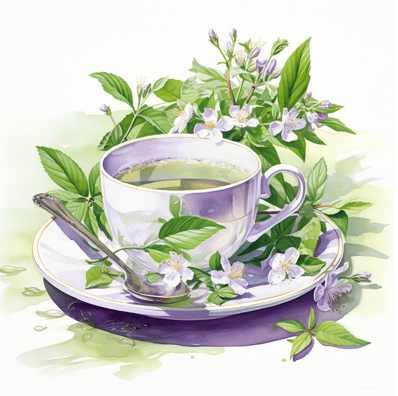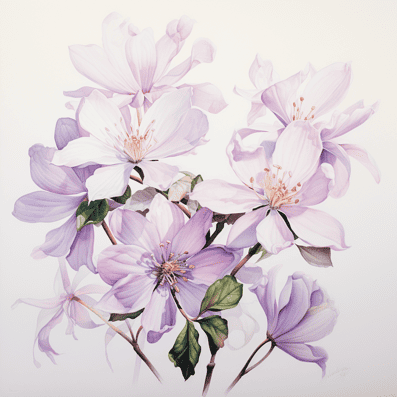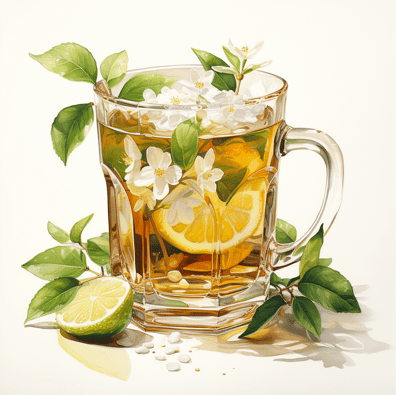
Want to fit beautiful scent of jasmine flower tea fit into your caffeine-free beauty regime? You can, but it depends on how it’s made, as jasmine flowers don’t have caffeine but the other things it’s blended with commonly do. See which types of Jasmine tea has the least and most caffeine below.
Hi, I’m Hazel
I gave up on skincare after years of issues with acne and sensitive skin.
But after going plant-based, my skin cleared up and even started to glow. Now I help women reveal their natural beauty with simple, delicious plant-based food.
I also used to be a nurse, and love nerding out on nutritional science (high-quality science, that is).

As usual, this post is based on the strongest nutritional evidence I could find with a focus on the simplest, most delicious foods
…because who has time to waste on actions that don’t work?
The quick version:
Jasmine tea is typically caffeinated, as it is often made by infusing green, black, or white tea leaves—each containing varying levels of caffeine—with jasmine flowers. The exact caffeine content depends on the tea base used, with herbal jasmine tea being a caffeine-free option.

What is Jasmine tea?
Known as the most famous scented tea, jasmine tea marries the delicate aroma of fresh jasmine flowers with a base of green tea leaves, black tea, or white tea.

The type of tea influences the overall flavour and caffeine level of the brew, making jasmine tea a versatile choice for both taste and energy needs. This beautiful blend creates an enchanting experience that complements a mindful, health-focused lifestyle.
You’ll also love:
Floral Bliss: What Does Jasmine Tea Taste Like?
How much caffeine is there in Jasmine tea?
Jasmine tea’s caffeine content varies based on the tea base used. Common jasmine tea typesinclude:
- Herbal Tea (just jasmine flowers): The fragrant flowers themselves no caffeine, as it uses no traditional caffeinated tea leaves. This one is the best placed for your new favourite tea.
- White Tea Base: Offers a milder caffeine boost.
- Green Tea Base: Commonly used, contains caffeine.
- Oolong Tea Base: Jasmine oolong teas provide a unique flavour with moderate caffeine, falling between green and black tea levels.
- Black Tea Base: Higher caffeine levels than green tea.
It’s important to note that jasmine itself does not contain caffeine; it’s the type of leaves in the tea blends that determine the amount of caffeine.
Herbal jasmine tea is available, typically blending non-caffeinated herbs with jasmine, making it perfect for those avoiding caffeine altogether.
You might also like:
Caffeine Overdose: Is All Black Tea Caffeinated?
Jasmine tea Benefits
The health benefits of jasmine tea extend beyond its mesmerising jasmine scent and taste.
This tea is packed with antioxidants, which are crucial for skin health combating daily oxidative stress and free radicals.
You’ll also love:
How to Glow Up With Jasmine Green Tea Skin Secrets

Drinking a cup of jasmine tea might also help in reducing stress thanks to its natural relaxing properties, enhancing your mood while providing a subtle energy boost without the harsh effects of high caffeine intake.
Embracing jasmine tea can seamlessly fit into a plant-based lifestyle, adding a touch of indulgence to your routine with every sip.
Types and Varieties of Jasmine tea

Jasmine tea comes in several delightful forms, each offering a unique experience:
- Loose Leaf Tea: Provides a richer flavour and aroma, allowing full jasmine blooms to infuse more completely.
- Tea Bags: Convenient and quick, suitable for busy lifestyles without sacrificing quality.
- Jasmine Pearl Tea: Consists of tea leaves hand-rolled with jasmine flowers, known for its intense flavour and high quality from the fragrant jasmine blossoms.
- Jasmine Bubble Tea: A modern twist that combines the traditional floral notes with the fun texture of tapioca pearls.
Exploring these different types of jasmine tea can help you discover which style best fits your taste and daily routine.
Choosing the Right Jasmine tea
Selecting the right jasmine tea involves considering your personal caffeine preferences and lifestyle needs:
- Herbal Jasmine Tea: Pure jasmine tea is best for those completely avoiding caffeine.
- White Tea Base: Ideal for those seeking lower caffeine content.
- Loose Leaf Tea: Loose leaf blends create high quality Jasmine teas. These offer a richer, more nuanced flavour and typically contains less caffeine than tea bags, making it a great choice for those looking to moderate their caffeine intake.
- Check Labels: Always look for information on caffeine levels to match your dietary needs.
- High-Quality Options: Opt for high-quality jasmine teas like jasmine pearl tea for a better taste and health benefits.
With these tips, you can find the jasmine tea that perfectly suits your taste, caffeine preferences, and wellness goals.
Conclusion
Is jasmine tea caffeinated? Yes, most varieties contain some caffeine, depending on the type of tea leaves used. Herbal versions offer a caffeine-free alternative, ensuring you can enjoy the soothing qualities of jasmine tea without disrupting your caffeine balance. With the variety of options available, there’s something for all tea lovers.
References
Most references below will link to the original peer-reviewed study itself. However, sometimes I will link to a video over at NutritionFacts.org instead, which is by far the single best resource of brutally transparent nutritional evidence you will ever see. Dr Greger tells a great story about the realities of the science and if I think you will benefit more from one of his videos, the link will take you there instead.
Happy nerding!
- Zhao Y, Li S, Du X, et al. Insights into momentous aroma dominating the characteristic flavor of jasmine tea. Food Sci Nutr. 2023;11(12):7841-7854. Published 2023 Sep 25. doi:10.1002/fsn3.3701
- Zhang Y, Huang J, Xiong Y, Zhang X, Lin Y, Liu Z. Jasmine Tea Attenuates Chronic Unpredictable Mild Stress-Induced Depressive-like Behavior in Rats via the Gut-Brain Axis. Nutrients. 2021;14(1):99. Published 2021 Dec 27. doi:10.3390/nu14010099